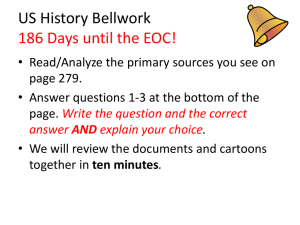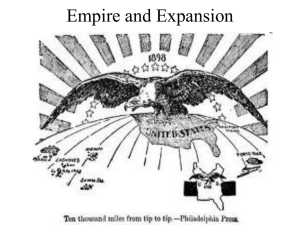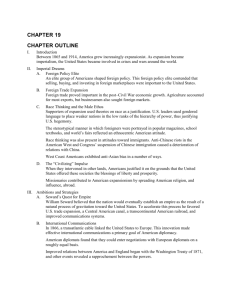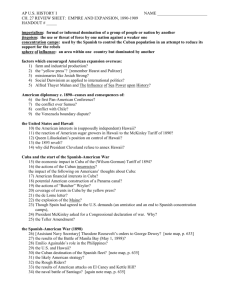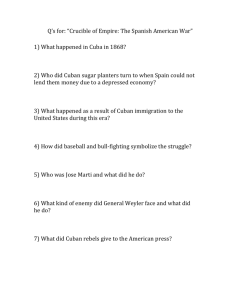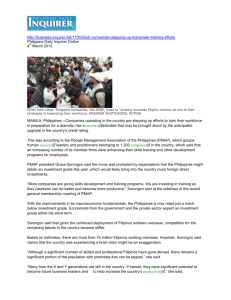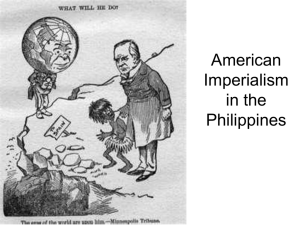Twain Imperialism in the Philippines
advertisement
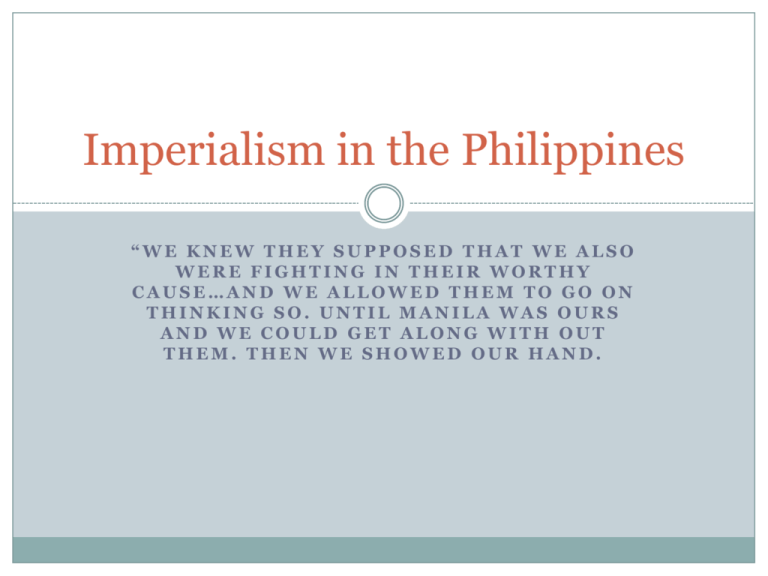
Imperialism in the Philippines “WE KNEW THEY SUPPOSED THAT WE ALSO WERE FIGHTING IN THEIR WORTHY CAUSE…AND WE ALLOWED THEM TO GO ON THINKING SO. UNTIL MANILA WAS OURS AND WE COULD GET ALONG WITH OUT THEM. THEN WE SHOWED OUR HAND. The War With Spain The impetus for the war was the Cuban anti-colonialist revolution. (Jose Marti—Poet, Revolutionary--1853-1995) The Spanish response to the revolution was brutal, and involved concentration camps and mass starvation. Cuba was of importance to the US and was also dependent on the US economically—Exports increased from 42% of the total in 1859 to 87% in 1897. US investments were about $50 million and trade at $100 million. Cuban Revolution Cuban revolutionaries like Marti looked to the US for help and inspiration. Some were already US citizens. Marti, Gomez, Maceo were worried about US dominance. Marti: “To change masters is not to be free…” Heart and Pulitzer (‘Yellow Press’) papers championed the cause of ‘Cuba libre.’ [But according to Herring, the yellow press didn’t cause the war.] President McKinley was not eager to go to war and Spain would allow some self-government but the rebels insisted on government free of Spanish influence. Losing Cuba would be losing the last bits of the Spanish Empire. When the Maine exploded by accident in 1898, and Spain was blamed, McKinley ended up going to war. McKinley McKinley became imperialist by happenstance, according to Herring. The Teller Amendment was that the US would not annex Cuba once the war ended. [Various factions— people worried about the blacks and Catholics in Cuba, those who were worried about competition in sugar, etc.] “You furnish the pictures and I’ll furnish the war.” Journalist Richard Harding Davis, “God looks after drunkards, babies and Americans…” The US defeats the Spanish in Cuba rather easily. (Only 345 KIA, 5,000 from sickness and $250 million.) The Navy goes to the Philippines. The victory ‘intoxicated Americans” (Herring, 316) “It was a splendid little war…” Ambassador Hay US Ambassador to France “No war in history has accomplished so much in so short a time with so little loss…” Hawaii annexed for reasons of manifest destiny. Growth of the US Empire US wanted to make sure to get Puerto Rico before Spain gave up and sued for peace. It was thought to be a way to increase security in the region. Teddy Roosevelt told Senator Lodge to “prevent any talk of peace until we get Porto Rico and the Philippines as well as secure the independence of Cuba.” Dewey defeated the Spanish in Manila Bay and took the rebel leader Aguinaldo to exile in Hong Kong. Resistance to Colonial Independence The Cuban rebels were idealized but then later regarded as a “ragged and half-starved” and “wretched mongrel lot.” Racism played a role in the negative stereotypes of the Cubans. Many Cubans in the rebel forces had African ancestors. General Shafter claimed the Cubans were no more fit for self-government than ‘gunpowder is for hell…’ (321) The Teller Amendment was ignored and the Cubans did not participate in the peace or surrender negotiations with the Spanish and they had to recognize the military authority of the US. Philippines The Filipinos were also expecting self-government. Aguinaldo declared the Philippines independent and himself as ‘provisional dictator.’ McKinley believed that the rebels could not sustain a government or prevent European encroachment and told the US military to compel the rebels to accept its authority. 30,000 Filipinos were present in Manila and not inclined to accept US authority. Results Americans expected the Cubans to be grateful, but the Cubans were not grateful and revolted again in the 1950s. McKinley talked about “benevolent assimilation” and said “our priceless principles undergo no change under a tropical sun. They go with the flag.” (p. 326) --What are these principles? The Filipinos began to see the US as the oppressor. The military began a pacification program—schools, roads, bridges, vaccinations, medicine, food. Taft went to help out America’s “little brown bothers.” Insurgency The Filipinos fought a war of insurgency. The US response was very brutal at times. Americans began “to view the war in racial terms, a conflict of ‘civilization’ in Roosevelt’s words against the black chaos of savagery and barbarism.” This included resettlement and torture. [Are there any parallels in today’s war.] Only July 4, 1902 Teddy Roosevelt declared the war ended with 4,000 dead and 2,800 wounded at a casualty rate of 5.5%. 20,000 Filipinos were killed and possibly as many as 200,000 civilians killed. Internal debate in the US There was an internal debate in the US over whether the US should be an empire. It is often said that Americans do not want an empire. Is this true? (You certainly don’t hear American politicians openly embracing imperial goals.) Some issues raised in the debate were: The strategic advantage of the Philippines, and the economic benefits. The islands were markets and they were also a jumping off point to other parts of Asia, especially China. They argued that the US had superior institutions and “an obligation to rescue lesser peoples from barbarism and ignorance and bring them the blessings of Anglo-Saxon civilization…” McKinley allegedly said that the US should “educate the Filipinos and uplift them and civilize them and Christianize them and by God’s grace do the very best we could be them.” Other arguments for imperialism Another argument was that the Filipinos/Cubans were not capable of self government and ripe for the plucking by Europe. McKinley “the currents of destiny flow thoruhg the hearts of the people…who will divert them? Who will stop them?” Arguments against Imperialism Patriotic arguments were that the “expansion would compromise America’s ideals and its special mission in the world…” The US would then be like Europe… Williams James said it was amazing how the US could “puke up its ancient soul…in five minutes without a wink of squeamishness…” He said the idea the US was uplifting the Filipinos was “snivelling” and “loathesome…” “God damn the US for its vile conduct in the Philippines…” Andrew Carnegie tried to buy the islands for $20 million. Racist Anti-Imperialism Ben Tilman (S. Carolina): “…opposed injecting into the ‘body politic of the United States that vitiated blood, that debased and ignorant people…” p. 323 The White Man’s Burden Rudyard Kipling: Take up the White man's burden -Send forth the best ye breed -Go bind your sons to exile To serve your captives' need; To wait in heavy harness On fluttered folk and wild -Your new-caught, sullen peoples, Half devil and half child. McClure’s 1899—seemed to urge war in the Philippines. To The Person Sitting in Darkness Who is “the person sitting in darkness”? How does Twain use irony? Attitudes What attitudes does Twain describe… Reverend Ament discusses the compensation he received at the killing of the missionaries. What is the point of the Pawnee example? (p. 110) What is ‘civilization’? “…shall we go on conferring our Civilization upon the peoples that sit in darkenss or shall we give those poor things a rest…Would it not be prudent to get our Civilization tools together and see how much stock is left?” (p. 112) “the Blessings-of-Civilization Trust…[t]here is more money in it, more territory, more sovereignty, and other kinds of emolument than there is in any other game that is played…But Christendom has been playing it badly of late years…[and] thePeople who Sit in Darkness have noticed it…and have begun to show alarm…” (112) (p. 113: What is ‘the game’?) Twain “The Philippine Mess” (personal letter) “You are supposing that I am moved by a Large Patriotism, and that I am distressed because our President has blundered up to his neck in the Philippine mess; and that I am grieved because this great big ignorant nation, which doesn’t know even the ABC facts of the Philippine episode, is in disgrace before the sarcastic world—drop that idea! I care nothing for the rest. I am only distressed and troubled because I am befouled by these things. That is all.” ‘The Philippine Mess’ What does it mean to be ‘befouled’ by these things. Why would he be befouled? Are the other motives intelligible decent motives? [E.g., distress over the nation’s disgrace…] Is a concern about being ‘befouled’ an ethical concern? What are people’s motives for distress over US foreign involvements? Is there a reason to feel befouled? American Exceptionalism What is American Exceptionalism?” “This nation is like all the others that have been spewed upon the earth—ready to shout for any couse that will tickle its vanity or fill its pocket…”


